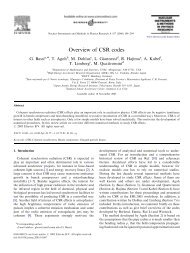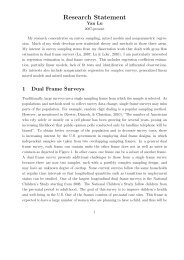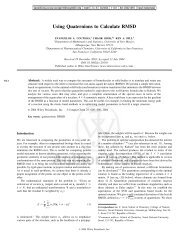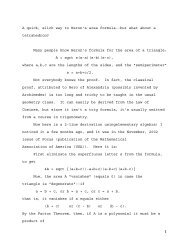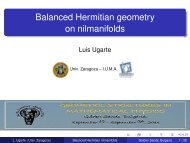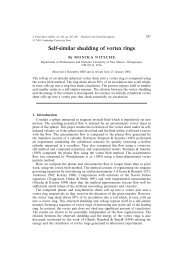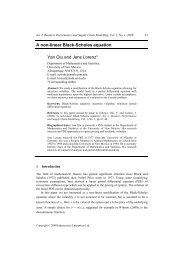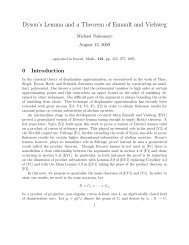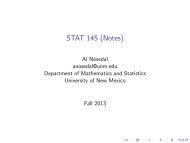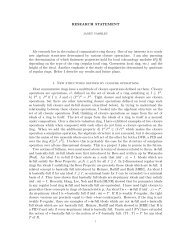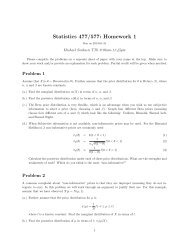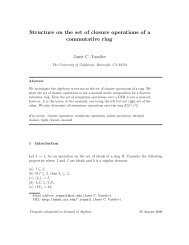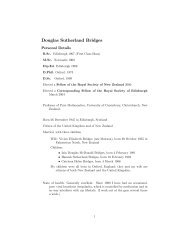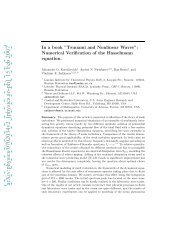OEO Office of Equal Opportunity - Department of Mathematics and ...
OEO Office of Equal Opportunity - Department of Mathematics and ...
OEO Office of Equal Opportunity - Department of Mathematics and ...
You also want an ePaper? Increase the reach of your titles
YUMPU automatically turns print PDFs into web optimized ePapers that Google loves.
258 ARTS AND SCIENCES<br />
336./536. Chinese Philosophy I. (3)<br />
The development <strong>of</strong> Chinese thought from pre-Confucian<br />
times through the T’ang dynasty.<br />
337./537. Chinese Philosophy II. (3)<br />
Chinese thought from the Sung dynasty to the present.<br />
341. Topics in Philosophy. (1-3 to a maximum <strong>of</strong> 12)<br />
[1-3] ∆<br />
An investigation <strong>of</strong> some important philosophic debates.<br />
342. Selected Philosophers. (3 to a maximum <strong>of</strong> 12) [3<br />
to a maximum <strong>of</strong> 18] ∆<br />
A treatment <strong>of</strong> the thought <strong>of</strong> a major philosopher.<br />
343./543. Contemporary Continental Philosophy. (3)<br />
A survey <strong>of</strong> main themes in Dilthey, Husserl, Scheler,<br />
Heidegger, Merleau-Ponty, Sartre, Hermeneutics,<br />
Structuralism, Deconstruction <strong>and</strong> the Frankfurt School.<br />
Prerequisite: 202.<br />
344./544. Nineteenth-Century Philosophy. (3)<br />
From Kant through Hegel, Marx, Schopenhauer, Kierkegaard,<br />
Mill, Nietzsche.<br />
Prerequisite: 202.<br />
346./546. Twentieth-Century Philosophy. (3 to a maximum<br />
<strong>of</strong> 12) [3] † ∆<br />
Twentieth-century philosophies.<br />
Prerequisite: 202 or 344.<br />
348./548. Comparative Philosophy. (3)<br />
A comparative study <strong>of</strong> the Buddhist, Chinese, European,<br />
Indian <strong>and</strong> Islamic philosophical traditions with reference to<br />
ontology, epistemology, axiology <strong>and</strong> sociopolitical thought.<br />
Prerequisite: 201 or 202 or 334.<br />
350./550. Philosophy <strong>of</strong> Science. (3)<br />
This course is a survey <strong>of</strong> the main epistemological, ontological<br />
<strong>and</strong> conceptual issues that arise from or concern the<br />
methodology <strong>and</strong> content <strong>of</strong> the empirical sciences.<br />
Prerequisite: 156 or 356.<br />
352./552. Theory <strong>of</strong> Knowledge. (3)<br />
Problems <strong>and</strong> theories <strong>of</strong> epistemology.<br />
Prerequisite: 101 or 201 or 202.<br />
354. Metaphysics. (3)<br />
Problems <strong>and</strong> theories <strong>of</strong> metaphysics. Topics may include:<br />
investigation into the structure <strong>of</strong> things <strong>and</strong> their properties,<br />
identity <strong>and</strong> individuation, causation, necessity <strong>and</strong> possibility,<br />
universals, mind <strong>and</strong> body, space <strong>and</strong> time, God, truth<br />
<strong>and</strong> naturalism.<br />
Prerequisite: 101 or 201 or 202.<br />
356. Symbolic Logic. (4)<br />
(Also <strong>of</strong>fered as MATH 356.) This is a first course in logical<br />
theory. Its primary goal is to study the notion <strong>of</strong> logical entailment<br />
<strong>and</strong> related concepts, such as consistency <strong>and</strong> contingency.<br />
Formal systems are developed to analyze these<br />
notions rigorously.<br />
358. Ethical Theory. (3)<br />
Inquiry concerning goodness, rightness, obligation, justice<br />
<strong>and</strong> freedom.<br />
Prerequisite: 101 or 102 or 201 or 202.<br />
360./560. Christian Classics. (3)<br />
(Also <strong>of</strong>fered as RELG 360.) A study <strong>of</strong> major writings in<br />
the Christian tradition, written by such persons as Origen,<br />
Augustine, Aquinas, Luther, Calvin <strong>and</strong> Teresa <strong>of</strong> Avila.<br />
Prerequisite: one course in Religious Studies or Philosophy.<br />
361./561. Modern Christian Thought. (3)<br />
(Also <strong>of</strong>fered as RELG 361.) Background <strong>of</strong> the intellectual<br />
issues facing Roman Catholic <strong>and</strong> Protestant traditions<br />
today.<br />
Prerequisite: one course in Religious Studies or Philosophy.<br />
363./563. Environmental Ethics. (3)<br />
Close reading <strong>of</strong> contemporary writings by naturalists, lawyers,<br />
theologians <strong>and</strong> philosophers on the philosophical<br />
aspects <strong>of</strong> environmental problems.<br />
365./565. Philosophy <strong>of</strong> Religion. (3)<br />
(Also <strong>of</strong>fered as RELG 365.) Philosophic analysis <strong>of</strong> some<br />
major concepts <strong>and</strong> problems in religion.<br />
Prerequisite: 156 or 201 or 202 or RELG 264.<br />
367./567. Philosophy <strong>of</strong> Art <strong>and</strong> Aesthetics. (3)<br />
Philosophical investigation <strong>of</strong> concept <strong>and</strong> theories <strong>of</strong> art <strong>and</strong><br />
literature. Possible topics include the nature, definition <strong>and</strong><br />
criteria <strong>of</strong> art; its functions; form <strong>and</strong> content; aesthetic experience;<br />
evaluation; artist’s/author’s status; meaning; reception;<br />
hermeneutics <strong>and</strong> representation.<br />
Prerequisite: one course in Philosophy.<br />
371./571. Classical Social <strong>and</strong> Political Philosophy. (3)<br />
From Plato to Hobbes.<br />
Prerequisite: 101 or 201.<br />
372./572. Modern Social <strong>and</strong> Political Philosophy. (3)<br />
From Hobbes to present.<br />
Prerequisite: 101 or 202 or 371.<br />
381./581. Philosophy <strong>of</strong> Law <strong>and</strong> Morals. (3)<br />
Nature <strong>and</strong> function <strong>of</strong> public law <strong>and</strong> its relation to moral<br />
belief.<br />
Prerequisite: 201 or 202 or 358.<br />
384./584. Philosophy <strong>of</strong> Mind. (3)<br />
A study <strong>of</strong> certain issues connected with the nature <strong>and</strong><br />
status <strong>of</strong> minds.<br />
Prerequisite: 201 or 202 or 352 or 354.<br />
388./588. Topics in Brazilian Thought. (3)<br />
(Also <strong>of</strong>fered as RELG 388.) A philosophical analysis <strong>of</strong><br />
selected topics from Brazilian intellectual history <strong>and</strong> contemporary<br />
Brazilian thought in the areas <strong>of</strong> art, economics,<br />
literature, philosophy, politics, religion, theatre <strong>and</strong> society.<br />
Prerequisite: one course in Philosophy.<br />
389./589. Latin American Thought I. (3)<br />
(Also <strong>of</strong>fered as HIST, RELG, SOC 389.) Pre-Columbian<br />
thought through independence ideologies.<br />
Prerequisite: one course in Philosophy.<br />
390./590. Latin American Thought II. (3)<br />
(Also <strong>of</strong>fered as HIST, RELG, SOC 390.) Positivism through<br />
contemporary thought.<br />
Prerequisite: one course in Philosophy.<br />
402./502. Plato. (3)<br />
Prerequisite: 101 or 201.<br />
403./503. Aristotle. (3)<br />
Prerequisite: 101 or 201.<br />
404./504. Augustine. (3)<br />
(Also <strong>of</strong>fered as RELG 404.)<br />
Prerequisite: 201 or RELG 360<br />
406./506. Descartes. (3)<br />
Prerequisite: one course in Philosophy.<br />
409./509. Hume. (3)<br />
Prerequisite: 202.<br />
410./510. Kant. (3)<br />
Prerequisite: 202.<br />
413./513. Kierkegaard. (3)<br />
(Also <strong>of</strong>fered as RELG 413.)<br />
415/515. History <strong>and</strong> Philosophy <strong>of</strong> <strong>Mathematics</strong>.<br />
[Philosophy <strong>of</strong> <strong>Mathematics</strong>.] (3)<br />
(Also <strong>of</strong>fered as MATH 415.) A historical survey <strong>of</strong> principal<br />
issues <strong>and</strong> controversies on the nature <strong>of</strong> mathematics.<br />
Emphasis varies from year to year. Student who does not<br />
have prerequisite may seek permission <strong>of</strong> instructor.<br />
Prerequisite: 356 or 456.<br />
UNM CATALOG 2006–2007 Symbols, page 611.



